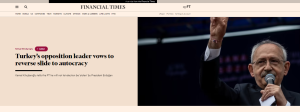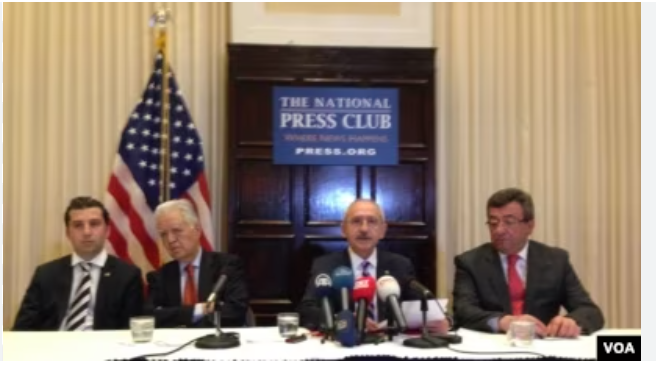Is there a Western preference as Turkey approaches a major inflection point on May 14th? Would the United States and Europe prefer president Recep Tayyip Erdogan to remain in power or finally see some change in Ankara? The conspiracy prone Turkish public opinion is often obsessed with external forces seeking to shape its destiny. The choice is of course for Turks to make in their own presidential and parliamentary elections. But because Erdogan is a master tactician at mobilizing such anti-Western domestic sentiment in his favor, there is much prudence, especially in Washington, not to take sides beyond pronouncements reminding the importance of “free and fair” elections. Underneath the surface, however, an unpronounced and highly self-serving Western preference seems to strangely exist. Sadly, it is the wrong one, unworthy of Western democracies that should be much more supportive of Turkish democracy instead of seeing Erdogan as the devil they know.
The autocratic trend in Erdogan’s Turkey, coupled with a foreign policy that blocks Sweden’s NATO membership, and embraces Putin’s Russia as a major economic and military partner should normally simplify matters for the West. Yet, the picture gets murkier when you dig a little deeper. For instance, the emerging conventional wisdom in Washington is that a post-Erdogan Ankara will not be fundamentally different in foreign policy and that the little amount of change will be more in style than in substance. The assumption is that the two fundamental problems on the Turkish-American agenda – mainly Ankara’s frustration with US support for Syrian Kurds and Washington’s frustration with the Turkish purchase of Russian S-400 missile defense systems – are not likely to disappear with an opposition victory. Similarly, if Erdogan happens to lose, no one expects a radical departure from Turkish positions on Cyprus, the Eastern Med or the Aegean sea. Turkish nationalism and the quest for strategic autonomy and independence is likely to endure as drivers of Turkish foreign policy.
What about expectations about the Turkish opposition and the Middle East ? Ironically, it is under Erdogan, that a major U-turn occurred in the last couple of years. Given the dismal state of the Turkish economy, Erdogan’s desperate need for cash has already led to a major shift in Ankara’s relations with Saudi Arabia and the United Arab Emirates. Erdogan’s charm offensive with the Gulf required revisions in Turkish support for the Muslim Brotherhood, which in turn also helped improve relations with Israel and Egypt. Such rapid recalibration in Turkish foreign policy probably reinforced the image of Erdogan in the West as a pragmatic opportunist rather than an Islamist ideologue. No wonder, a former American Ambassador to Ankara, who has a long history of dealing with Erdogan had no qualms expressing his preference for him as “the devil we know”.
Today, with the hope of repatriating some of the four million Syrian refugees in Turkey, Erdogan is even seeking normalization with Bashar Assad’s Syria – a regime he was trying hard to topple only a few years ago. This question of Syrian refugees brings us to European positions on Erdogan. Normally, France, Germany, and Italy as well as other European countries such as Greece and Cyprus who are on the receiving end of Erdogan’s confrontational language should root for a change of power in Ankara. Yet, there is some apprehension in France and Germany that a new Turkish government under the leadership of Kemal Kilicdaroglu will want to review the 2016 refugee pact signed between Ankara and Brussels. As it will be remembered, at the height of the refugee crisis the European Union made it peace with Erdogan by offering Turkey 6 billion euros to stem the tide of Syrian migrants.
Kemal Kilicdaroglu, the leader of the main opposition, the secularist and social democratic Republican Peoples Party (CHP) strongly rejected this refugee deal between Ankara and Brussels when it was signed. Today, Kilicdaroglu is running against Erdogan as the joint candidate of an eclectic coalition of six political parties, includes a strongly nationalist one. The campaign platform of this “Nation Alliance” is committed to improved relations with the EU but it also seeks to renegotiate the refugee deal, with what Kilicdaroglu calls a “Turkey first” approach. Is Europe ready to embrace a post-Erdogan Turkey that wants better relations in search of full membership as well as new refugee deal that better protects Turkish national interests ? The answer is “no.” Neither France nor Germany are in a mood to talk about Turkey’s long-forgotten EU membership. And there is of course no willingness to accept more refugees to Europe. It may therefore be easier to deal in a transactional framework with a prickly nationalist like Erdogan, who has burned many bridges with Brussels, as the devil they know. And an angry autocrat with not a democratic bone in his body is much easier to reject than a democratic Turkey seeking to revive its European vocation.

Finally, I was deeply surprised in a recent visit to Athens to see that the Greek foreign policy establishment seemed perfectly happy with the prospect of Erdogan winning another election, from a purely realpolitik and cynical national perspective. The Greek position can be explained by the fact that an autocratic and mercurial Erdogan constantly sabre rattling in the Eastern Med and the Aegean creates Western sympathy for Athens. It is not a coincidence that Greek-American relations are today at an all-time high, partly due to the unreliability of Turkey as a NATO partner. After 20 years of dealing with him, for Greece Erdogan is truly the devil they know in a country where they see no angels.
Omer Taspınar is a Professor of Security Studies at the National Defense University in Washington DC. He also teaches at the Johns Hopkins University, SAIS (School of Advanced International Studies).
This is an excerpt from a Ekathimerini article, visit link for the full text
Follow our English language YouTube videos @ REAL TURKEY: https://www.youtube.com/channel/UCKpFJB4GFiNkhmpVZQ_d9Rg
And content at Twitter: @AtillaEng
Facebook: Real Turkey Channel: https://www.facebook.com/realturkeychannel/
